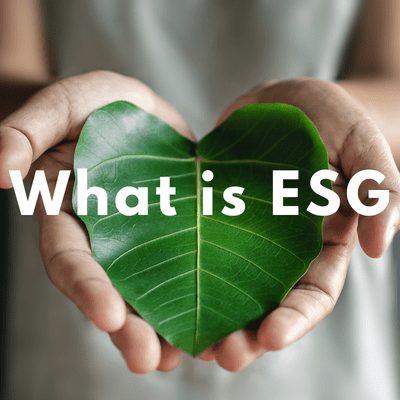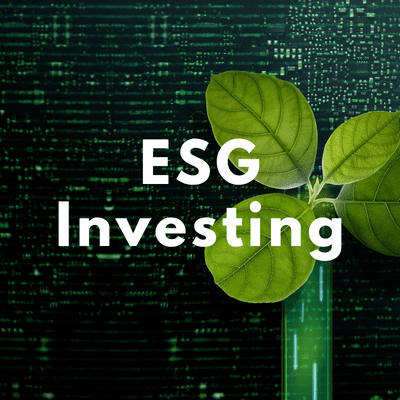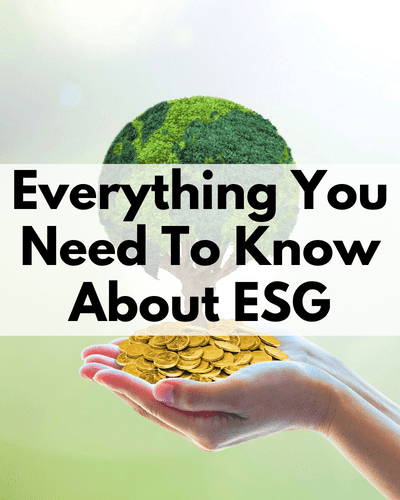SKL is reader supported. When you buy through links on our site, we may earn affiliate commission. Learn more here.
Curious about what ESG means, where the term comes from, and how ESG can improve your sustainability efforts? We have got you covered with this mini guide to everything ESG!
What is ESG? Your guide to the three pillars of Environmental, Social, and Governance (ESG).

For many of us, going green is one of the most important ways we can make a positive impact on our environment.
But what if there was more to it than just changing up your lifestyle in a few small ways?
There’s actually an even bigger picture that’s often overlooked—one that includes both environmental, social, and governance (ESG) issues.
Going green without considering these three key pillars of ESG can mean missing out on the opportunity to create lasting, sustainable change for our planet.
In this blog post, we’ll explain why you can’t go green without also going red and blue (ESG). We’ll look at how investing in ESG-focused companies and embracing ESG principles can help create a greener future.
By the end, you’ll have a better understanding of why it’s important to consider all aspects of sustainability when going green. So let’s get started!
What is ESG?
You may have heard this acronym thrown around before, but what does it actually mean? ESG stands for environmental, social, and governance.
It’s a way of assessing how sustainable a company is by looking at these three pillars of sustainability. Environmental issues are things like energy efficiency and waste management; social focuses on factors such as diversity and inclusion; and governance refers to how companies are managed and how the board of directors is structured.
All three areas are essential components of a company’s sustainability strategy, and they should all be taken into account when assessing its performance.
Why does ESG Matter?
Ultimately, ESG investing helps to create a more sustainable future. By investing in companies that have adopted an ESG approach, we can ensure that our money is being put to good use.
These companies often employ more sustainable practices, which helps the environment and society. They also tend to be better managed and have stronger governance structures, meaning their financial performance tends to be more reliable over the long term.
This makes them attractive investments for anyone looking to make a positive impact with their money.
3 Pillars of ESG

What are the environmental (green) aspects of ESG?
When assessing the environmental aspects of a companies operations, it’s important to consider things such as energy efficiency, water usage, water waste and waste management.
Companies that have adopted an ESG approach are often more mindful of their environmental impact, and they strive to reduce their carbon footprint by employing green technologies and practices.
Additionally, ESG investing encourages companies to create a more sustainable supply chain, which can result in fewer CO2 emissions and a reduced environmental impact.
What are the social (red) aspects of ESG?
Assessing a companies social practices is just as important when considering ESG. This involves looking at things such as diversity and inclusion, employee health and safety, human rights, labor policies, and community engagement.
Companies that have adopted an ESG approach often prioritize these areas, striving to create a more diverse workplace with better working conditions for their employees.
They may also be more active in their local communities, engaging in philanthropic activities and striving to make a positive impact.
What are the governance (blue) aspects of ESG?
The governance aspect of ESG considers how companies are managed and structured. This includes looking at things such as board diversity, executive compensation, corporate transparency, shareholder engagement, and risk management.
Companies with strong governance practices tend to be better managed and have better financial performance in the long run.
They are also more likely to adhere to regulations and ethical standards, making them attractive investments for those looking to make a positive impact with their money.
ESG Investing

What are ESG investors?
While most of think of investors as people looking to make a financial return on their investments, ESG investors are those who focus on the sustainability of their investments.
They look for companies that have adopted an ESG approach and actively seek out opportunities to invest in companies with strong social and environmental practices.
By doing this, they can ensure that their money is being used to support sustainable businesses and help create a more sustainable future.
What is Impact Investing?
Impact investing is an emerging trend in the world of ESG investing. It involves making investments with the intention of generating a positive social or environmental impact, as well as a financial return.
This can include things such as investing in renewable energy projects or companies that are working to eliminate poverty. Impact investing allows investors to make a positive contribution to the world while also making money, creating a win-win situation for all involved.
One of the first impact investors was with the Dutch East India Company, which invested in the first public offering of shares to finance its voyages.
Isaac Le Maire is considered by many to be the first shareholder activist. This is because he led the first recorded shareholder activism in 1608 when he protested against corruption in the Dutch East India Company. After buying shares in the company, he eventually was given a seat on the board where he could help make his changes.
Today, impact investing is used by a variety of investors who are looking for ways to make a positive difference in the world with their money.
How Can You Get Involved with ESG Investing?
Getting involved with ESG investing is easier than you might think!
Many major financial institutions now offer products that focus on ESG principles, meaning you can start investing in companies like this quickly and easily.
Alternatively, you can look for opportunities to invest directly in companies that have adopted an ESG approach and look for those that align with your own values. Doing this gives you the chance to make a real difference in the world while also making money.
As a consumer, you can also support companies that have adopted an ESG approach by buying their products and services. This helps to spread the message about sustainability, which in turn encourages more companies to adopt this philosophy. In this way, you can make a direct impact on society simply by making conscious decisions with your money.
Ultimately, ESG investing allows us to make a positive impact on the world while also making money. By investing responsibly and supporting companies that have adopted an ESG approach, we can help to create a more sustainable future for everyone.
So whether you’re an investor or just someone looking to make a difference with their money, now could be the perfect time to get involved in ESG investing.
What is a B Corp?
When it comes to sustainable businesses, B Corps are at the forefront.
B Corps, or Benefit Corporations, are businesses that have been certified as meeting high standards of social and environmental performance, legal accountability, and transparency. They must meet rigorous criteria on all aspects of sustainability including energy use, employee benefits, waste reduction and more.
This certification not only encourages companies to adopt sustainable practices but also allows them to demonstrate their commitment to responsible and ethical business practices.
B Corps allow investors to put their money behind businesses that are committed to building a better world. By investing in B Corps, investors can be sure that they are supporting companies that have made a conscious decision to operate sustainably and responsibly. This ensures that the money being invested is being used to create meaningful and lasting change in the world.
In short, B Corps provide investors with a way of putting their money behind businesses that are making a positive impact in the world. As more and more companies adopt this certification, it is becoming easier for investors to make an ethical choice when investing their money.
This is great news for those who want to make a positive difference with their money while also making a profit.
How To Add ESG Into Your Own Life

10 ways to incorporate ESG at home:
- Eat less meat: Reducing your consumption of animal products can have a huge impact on the environment.
- Reduce waste: Make sure you recycle and compost as much as possible to reduce the amount of waste going into landfills.
- Use green energy: Look for ways to switch to renewable energy sources such as solar or wind power.
- Shop local: Supporting local businesses reduces the amount of energy used to transport goods from far away places.
- Drive less: Try using public transportation, carpooling or biking whenever possible to reduce your fuel consumption.
- Use fewer plastics: Say no to plastic bags and look for alternatives such as reusable containers.
- Conserve water: Take shorter showers and only use the dishwasher or washing machine when you have a full load.
- Buy from sustainable businesses: When shopping, look for companies that use sustainable practices such as recycling and reduced packaging.
- Support green initiatives: Look for ways to get involved in organizations and campaigns aimed at protecting the environment.
- Educate others: Share your knowledge with friends and family members so they can make more informed decisions about their lifestyle choices.
10 ways to incorporate ESG at work:
- Telecommute: Encourage employees to work from home or remotely when possible to reduce the amount of energy used for commuting.
- Move towards paperless processes: Switch to digital file storage and digital communication where applicable.
- Use renewable energy sources: Look into installing solar panels or switching to a wind-powered electricity service for your building.
- Recycle: Encourage employees to recycle their waste and implement recycling bins around the office.
- Buy green products: Source sustainable items such as recycled paper, eco-friendly cleaning supplies, and energy efficient appliances for your workplace.
- Use fewer disposables: Provide reusable cups and dishes in the office kitchen and install water-saving fixtures in the bathrooms.
- Install LED lighting: Switching to LED bulbs can save energy and money on your electric bill.
- Encourage green transportation: Offer incentives for employees to use public transportation, carpool or bike to work when possible.
- Educate employees: Make sure employees are aware of the importance of sustainability and how their actions can make a difference.
- Measure sustainability efforts: Set goals for reducing energy consumption, waste and water usage and track your sustainability progress in a report to ensure you’re on track to meet them.
ESG for Investing, Home and Work
By taking steps towards making work more sustainable, businesses can show that they care about the environment and are taking action to reduce their environmental impact.
Consumers also increasingly value companies that are making an effort to be green, red and blue – meaning they’re actively committed to reducing their carbon footprint, investing in renewable energy sources, and engaging in ethical business practices.
By leveraging these three core aspects of sustainability, businesses can demonstrate their commitment to the environment and society as a whole, while also making a profit.
Dean Emerick is a Digital Strategist on sustainability with ESG The Report, an online resource of like-minded professionals focusing on ESG principles and socially responsible investment for a more sustainable future. www.esgthereport.com
If you liked this post, you’ll definitely want to check out these other posts from SKL:
Like it? Help support our work by sharing!









[…] Things You Need To Know About ESG, a strong ESG proposition can create value by driving growth, cutting costs, reducing legal and regulatory headaches, improving productivity and helping to optimize investments. It can also help boards and stakeholders to understand the risks and opportunities they face, and build trust in the long-term sustainability of a company. […]